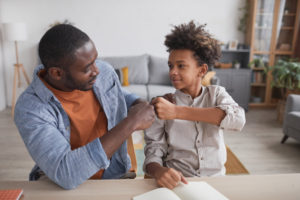Once upon a time, I had a teenager deep in the struggles of discovering their identity. They were trying to find their place amongst peers, succeed in school, and rise to the top of their sport. All while managing the ups and downs of hormonal changes and surviving the turbulent last year of middle school.
I knew something was going on with my teenager. I’d recognized the gradual distancing, the increased time spent alone in their room, and the infatuation with their newly acquired phone.
But nothing could have prepared me for what came next.
I received a phone call from a friend asking if my teen was ok. I had no idea what she was referring to so, “Yes” was the only answer I could muster. She then told a story that seemed like it could only happen in a movie.
Our teens were good friends and texted often. As their friendship had grown, her teen had become aware of my teen’s allergies and emotional challenges. My teen was not shy in expressing their feelings of self-doubt, sadness, anxiety, and loneliness. As she continued to share, it seemed obvious my teen was doing typical “teen things”, so I was beginning to wonder where the climax of this story would be and then, Wham!, it hit me.
She told me my teen had pretended to have eaten food they’re allergic to and texted this information to the friend. The friend, clearly in a state of concern and panic, continued to text my teen to ensure they were safe and ok. My teen catastrophized it by texting “as if” in life or death danger, including details of a pretend 911 call and life-saving rescue by paramedics.
My mind spun in endless confusion and questioning, “Hold on, say what? Are you sure? This seems crazy. My teen did what?”
I felt terrible. Terrible for me, terrible for her, terrible for her teen, and terrible for my teen. It was ALL so terrible.
All I could say was, “I’m so sorry and thank you for letting me know.”
After hanging up the phone, I marched into my teen’s room and initiated a confrontation.
Immediately my teen knew there was trouble as my “You did what?!” face was unmistakable.
I freaked out. I lost my cool. I yelled. I questioned my teen’s motives. I interrogated my teen till I felt certain the ramifications of this behavior were understood. I made it clearly known how deeply disappointed I was. I made sure going forward the “should do’s” and “should not do’s” were crystal clear and inexplicably understood by my teen. My teen offered only a few words I did not believe so I left the room in anger.
As you might have guessed, this was not my finest moment as a parent. Even writing this story made me cringe deep inside. But it’s a true story that has shaped me and my teen.
I’m not certain how many times in my parenting journey I’ve made my “You did what?!” face, but I know it’s more than I’d like to admit. It used to be extremely difficult for me to maintain my composure when my children told me things I didn’t want to hear. My instant reaction was always very evident to them. I couldn’t hide my emotions. They knew within moments what my verbal response would be based on the look on my face.
The way you react to your teen matters.
I had mistakenly taught my teen that I was not someone to share with. That I was judgmental. That I was more interested in fixing the behavior than understanding the behavior. That WHAT my teen had done mattered more to me than WHY my teen had done it. That I cared more about what other people thought of our family than what my teen thought of me.
I had opted to fix the situation instead of figure out the situation.
Over the last few years, I’ve chosen to transform myself from a mother my children want to avoid into a mother they want to talk to and spend time with.
Awareness transformed me. Here’s what I learned.
First, I learned judgment always creates separation. Showing up with curiosity creates compassion. Choosing curiosity over judgment works.
It looks like this in your mind, “Huh, that’s so interesting. I wonder why my teen is choosing to do/say that? Let me try to understand.”
Had I spent time being curious about WHY my teen made that choice, I would have learned SO MUCH MORE than I did by being judgmental. Judgment told me the behavior was wrong and needed immediate correction. Curiosity would have shown me that my teen was desperately in need of affection, attention, and self-confidence AND was willing to go to extremes to get it to feel better if only for a brief moment. My words that day only affirmed for my teenager what they already felt was true. They were lost in their own world: alone, incomplete, and inadequate.
Imagine the difference if I had allowed myself space to process the situation completely before addressing it. Then, at a later time when my emotions were less heightened, said to my teen, “I heard about some text messages you sent your friend. I’m so sorry you’re going through some stuff. Being a teenager is not easy and I know you’re trying your best. Please know I love you no matter what and I’m always here for you. I think you’ll feel better if you talk about it. I’m up for listening, are you up for talking?”
Second, I learned that my reaction matters.
No matter what your teen’s behavior is (pornography, slamming doors, cursing, cutting, vaping, having sex, lying, yelling, sexting, failing school, hitting, running away, missing curfew), you must NOT react. Definitely do NOT react like a crazy parent as I did. 😉
It looks like this in your mind, “Ahhh, of course, my teen is choosing to ___(fill in a behavior)___. Now what? How do I show up as the mom I want to be and my teen needs me to be?”
Learning to think this way and control my reactions helped me listen to understand, to share my ideas without forcing my teens to comply or change, and to create avenues for further communication and open dialogue.
Third, everything your teen does is neutral.
This was the challenging part for me. I had so much judgment of my teen’s behavior that I couldn’t open myself to the “terrible” things that were happening. Once I recognized nothing they did was either good or bad, IT JUST WAS, I created space for us to connect and understand each other. The truth is, I too did “terrible” things as a teenager I wish my parents would have labeled as “neutral”. How empowering that could have been in my life.
Fourth, notice the meaning you attach to events, people, and behaviors.
When I received the phone call from my friend and heard the story she told, I attached all kinds of meaning to myself and my teen. Things like:
– People are going to judge us.
– If I was a good mom, my teen wouldn’t do that.
– If I was a good mom, my teen would NEVER have thought that up.
– If I was a good mom, this would not have happened.
– This is all my fault. I’m to blame.
– My teen has no respect for other people.
– My teen is so rude.
– Only a crazy person would say and do this.
– My teen has lost their mind.
Our brains are made to attach meaning to everything in our lives. The meaning our brain attaches to an event or behavior is entirely in our control. We don’t realize it until we do thought work and learn to manage our thinking, but it IS in our power. Choosing with intention the meaning we attach to all circumstances is how we create ownership in our lives. It’s how we get our power back.
You can interpret any situation in a way that serves you or in a way that hurts you.
Alright, my friend. Here’s your chance to do your “You did what?!” face ONE LAST TIME just for fun. Now, let it go. Promise you’ll never do it again.




